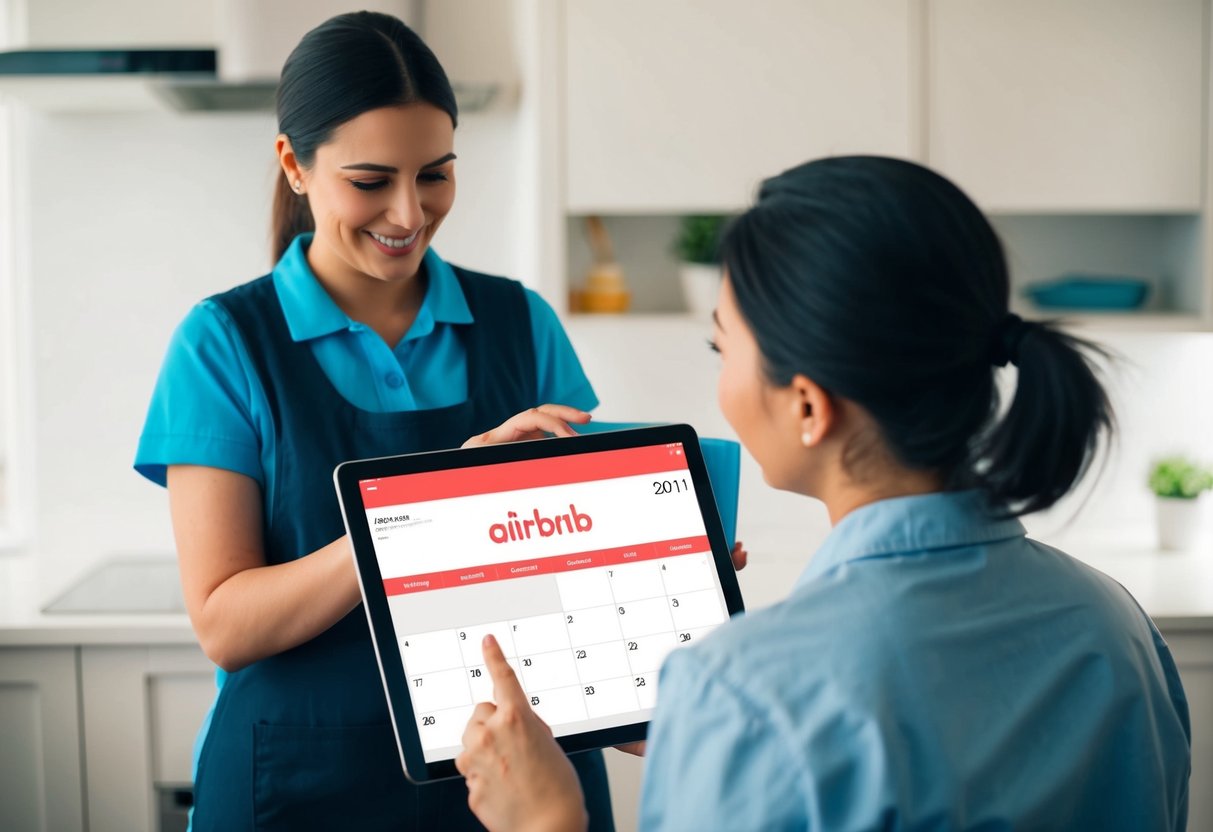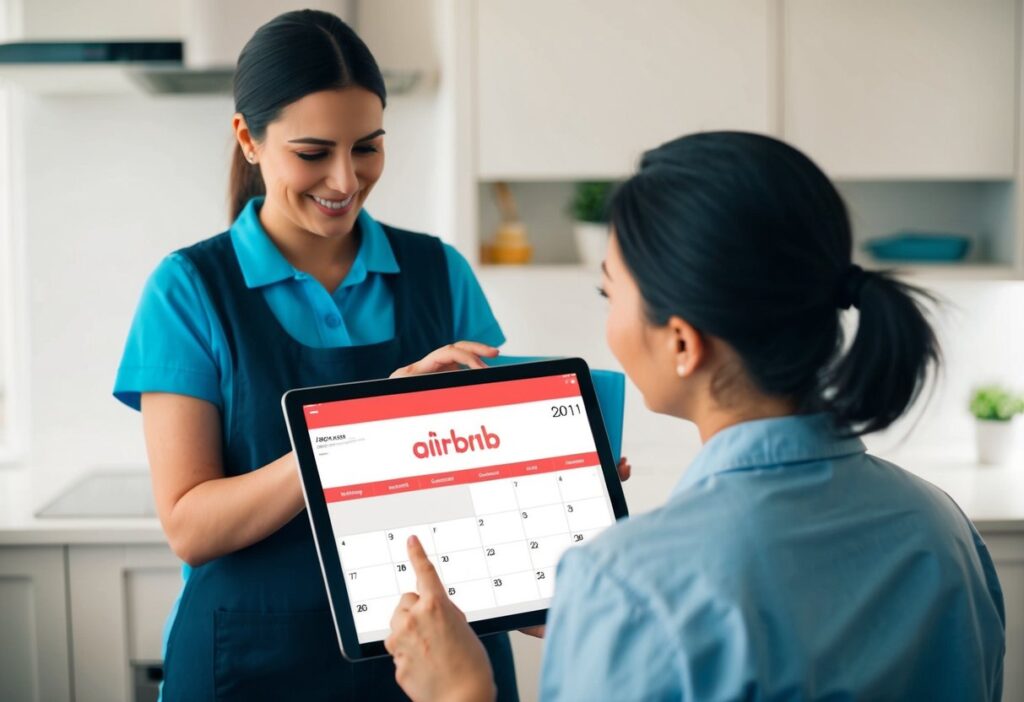Okay, your Airbnb is listed. The photos look sharp, the bookings are coming in… but what about the money? Like, real money. Smart Airbnb revenue management helps top hosts succeed. It boosts rental income, reduces empty nights, and earns favor with the Airbnb algorithm. No matter if you own one property or many, these tips can help you make hosting a profitable business by improving your property’s performance and increasing your overall revenue.
Ready to stop wasting money? Let’s optimize your pricing, fill that calendar, and win BIG.
Key Takeaways
- Boost Earnings with Smart Pricing: Use dynamic pricing tools to automatically adjust rates based on demand. Hosts who switch from static pricing to dynamic pricing can boost revenue by 10–40%.
- Stay Ahead with Market Insights: Monitor competitor rates, occupancy trends, and local events. Use this information to adjust your pricing strategy and remain competitive.
- Enhance Your Listing to Boost Bookings: Use professional photos and engaging descriptions. This can raise your visibility and increase bookings by up to 30%.
- Encourage Longer Stays: Give discounts for longer stays. Change minimum stay requirements during busy times. This helps to cut turnover and increase revenue.
- Capitalize on Peak Seasons: Raise prices and require a minimum stay during busy times. This helps you earn more with fewer bookings.
- Deliver 5-Star Guest Experiences: Fast responses, personal touches, and top-notch cleanliness lead to better reviews, repeat bookings, and premium pricing power.
What is Airbnb Revenue Management?
Airbnb revenue management is the art and science of pricing your short-term rental to maximize revenue. It’s not about charging the highest price and being empty—it’s about charging the right price and being full. It’s about charging the highest possible price while ensuring your property remains booked, thereby maximizing revenue. That means analyzing local demand, market trends, occupancy rates, seasonality, competitor pricing, and even major events that could affect potential guests’ behavior. When done well, it keeps your calendar full and your rental income growing.
Think of it like managing a boutique shop: you wouldn’t set one price and forget it. You’d adjust pricing based on foot traffic, weather, what your competitors are doing, and what’s happening in town. Your Airbnb listing works the same way. Your storefront is the listing page, and your pricing strategy? That’s the cash register ringing every night—optimizing your property’s performance with every booking.
To put it in perspective, Airbnb pulled in over $11.1 billion in revenue and more than $2.6 billion in profit in 2024. That level of success doesn’t come from guesswork—it’s driven by sharp pricing, smart data, and responsive strategies. And the good news? Hosts like you can tap into the same techniques to boost your own revenue.
Why Airbnb Revenue Management Matters
Let’s face it—Airbnb isn’t just about handing over the keys and hoping for five stars. It’s a business. Smart businesses know that managing pricing and occupancy is key. It can make or break your profits. Revenue management changes “just getting by” to “booking months ahead and making big profits.”
Here’s why it matters more than ever:
- Higher Revenue: Keep more money and draw in more guests. Avoid high rates that push them away. It’s all about hitting the perfect price at the perfect time to maximize every booking.
- Boost Occupancy Like a Pro: Got mid-week gaps or off-season lulls? Smart pricing helps fill them. Better occupancy means steadier cash flow—and a business you can count on.
- Stay One Step Ahead: The market is in a state of constant change. Events pop up, competitors drop prices, and seasons change. Strong revenue management helps you stay agile. You can adjust your listing without delay to maintain its appeal compared to the one down the block.
Revenue Impact Insight
Hosts who use Airbnb revenue management get real results. They increase their income. That’s not fluff; that’s data-backed growth. Mastering revenue strategy turns your rental into a money-making machine. It helps you work smarter, not just harder. Whether you’re a solo host or part of a team of professional vacation rental managers, this skill is essential.
Here are 12 effective revenue management strategies. They can help you earn more, fill your schedule, and beat the competition—no guessing needed.
1. Master the Fundamentals of Airbnb Revenue Management
Before adjusting pricing or following trends, understand the basics of revenue management. Think of these as the dials and levers behind a high-performing Airbnb business. When used right, they maximize revenue and unlock your listing’s full earning potential.
- Dynamic Pricing: Forget set-it-and-forget-it pricing. Smart hosts change their nightly rates. They consider demand, occupancy, season, booking time, and local events. Your pricing should match market conditions, whether it’s a holiday weekend or just a Tuesday. In fact, a McKinsey study shows that dynamic pricing alone can bump Airbnb earnings by up to 10%.
- Market Analysis: Staying competitive means keeping an eye on the playing field. Check similar listings in your area often. Look at their prices, occupancy rates, and see how your listing compares. This data-driven method helps you identify areas where you can improve and keeps your pricing based on market facts, not dreams.
- Occupancy Optimization: High nightly rates are great—until they leave your calendar empty. The goal is to find the right balance. You want a rate that makes your listing appealing and keeps your occupancy strong. Remember, it’s the total revenue that matters, not just the rate per night.
- Length of Stay Strategy: Want fewer check-ins and more stable income? Incentivize extended stays. It’s a win-win for you and your guests.
- Seasonal Adjustments: Airbnb is a seasonal game, and timing is everything. Pricing too low during peak demand or too high during slow months both hurt your bottom line. Hosts who dial in their seasonal strategy can see revenue boosts of up to 24% during peak seasons compared to those who don’t adjust at all.
Revenue Management Fundamentals
Think of revenue management as the control panel for your Airbnb. These key ideas help you boost profits, outshine competitors, and attract more guests to stay busy year-round.
When you grasp dynamic pricing, you stop guessing. Instead, you adjust rates based on real demand, occupancy, local events, and the time of year. When you add market analysis, you’re not guessing. You’re using data to make smarter and quicker decisions. Add occupancy optimization, and you’ll find the sweet spot. That’s where higher rates and steady bookings come together. Then, factor in length-of-stay strategies to reduce turnover chaos and boost booking value. Add seasonal adjustments, and you have a pricing model that adapts to guest demand.
These fundamentals form a revenue playbook. It helps you stay competitive, adapt to market changes, and boost income like a pro. Once you’ve nailed the basics, you’re ready to start scaling smarter, not just harder.
2. Implement Dynamic Pricing Like a Pro
If Airbnb revenue management had a power move, it would be dynamic pricing. This strategy is key to maximizing revenue. It keeps you strong during slow times and helps you earn more when demand rises. Dynamic pricing helps you decide what to charge. It uses real-time data, so you can make the most of each available room each night.
- Use Smart Pricing Tools: First, stop manual updates. Let technology handle the hard work. PriceLabs, Beyond, and Wheelhouse analyze local demand and booking trends. They also consider events, seasonality, and how well your listing performs. They help set the right price each day. These platforms are like your personal revenue managers, working 24/7 so you don’t have to.
- Set a Strong Base Price: Your base price must cover costs, show your property’s worth, and allow for profit. Think of it as your pricing anchor. It keeps your rates profitable, even when demand changes a lot.
- Define a Smart Price Range: Set minimum and maximum prices. This helps you avoid underselling in low seasons and overpricing on high-demand weekends (to avoid bad reviews). This gives your dynamic pricing tool room to breathe without going rogue.
- Respond to Local Demand: Big concert in town? Holiday weekend? Quiet midweek in February? Adjust your pricing based on real-world events and patterns. Dynamic pricing works best when you know why prices change, not just the figures.
- Stay Involved and Adaptive: Pricing tools aren’t set-it-and-forget-it. Evaluate your performance on a regular basis. If your calendar is filling up too fast, you might have priced yourself too low. If it’s crickets, you need to sweeten the deal. Use data to identify areas for improvement and fine-tune your pricing rhythm.
Dynamic Pricing Impact
Done right, dynamic pricing isn’t just smart—it’s transformative. Hosts using these tools and strategies often see a significant revenue jump. This is better than static pricing. Why? They charge more when it matters and remain competitive during slow booking lead times. It’s not just about raising prices—it’s about being strategic every single night.
3. Analyze the Market Trends and Competition
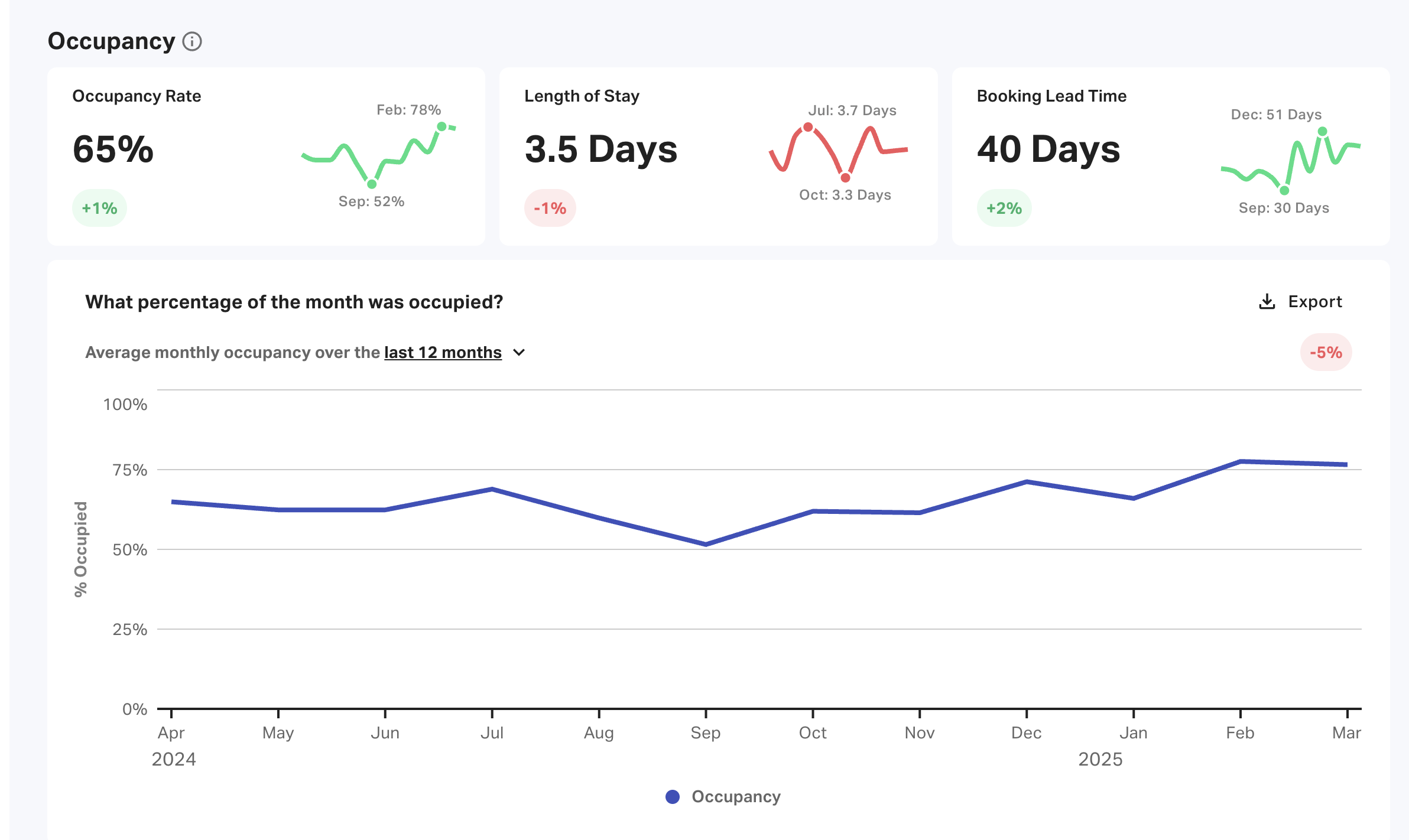
AirDNA and Airbtics provide valuable insights into key market metrics
You wouldn’t sail without a compass, right? The same goes for running a high-performing Airbnb—you need to know what’s happening around you. Market analysis is your GPS. It helps with revenue management, lets you set prices, find hidden revenue potential, and beat other hosts competing for the same guests.
- Spy on Your Competitors: Keep an eye on similar listings. Check those with the same bed count, amenities, location, and vibe. How much are they charging? How booked are they? If their calendar is packed and yours has crickets, you need to re-evaluate. The right tools, like AirDNA and Airbtics, simplify competitive research to an extreme degree. They achieve this by mixing scraped and sourced data from Airbnb and Vrbo. That’s not just guesswork—that’s precision.
- Track Occupancy Like a Hawk: Know when your market breathes. Are bookings booming on weekends but snoozy midweek? Does a quiet shoulder season bring steady traffic without much notice? Watching local occupancy trends can help you optimize revenue generation by adjusting your pricing calendar and availability. This way, you can fill more nights.
- Event Watch = Revenue Boost: Big events mean big opportunities. Think music festivals, marathons, conventions, graduation weekends—these are gold mines. Plug those dates into your calendar and adjust your pricing well in advance. Good Airbnb revenue managers don’t just react—they plan for demand surges like seasoned pros.
- Track Seasonal Demand Like a Pro: Every place has its own rhythm—beach days, ski season, or holiday fun. Use that knowledge to increase rates during high-demand times. Then, offer targeted discounts when demand slows down. Staying in tune with local demand helps keep your bookings steady year-round.
- Use Data, Not Vibes: Stop guessing and start optimizing. Tools like AirDNA and Airbtics provide reliable insights on occupancy rates, average daily rates (ADR), booking windows, and market trends. Both platforms offer robust dashboards that help you make data-driven decisions and stay ahead of the competition.
Market Analysis Benefits
When you understand your market, you stop reacting and start predicting. That’s the difference between chasing bookings and attracting them. Hosts who use market data, watch trends, and follow local demand stay ahead. Their Airbnb earnings prove it. In the fast-paced world of short-term rentals, data is more than insight—it’s your profit engine.
4. Optimize Your Airbnb Listing for Maximum Visibility
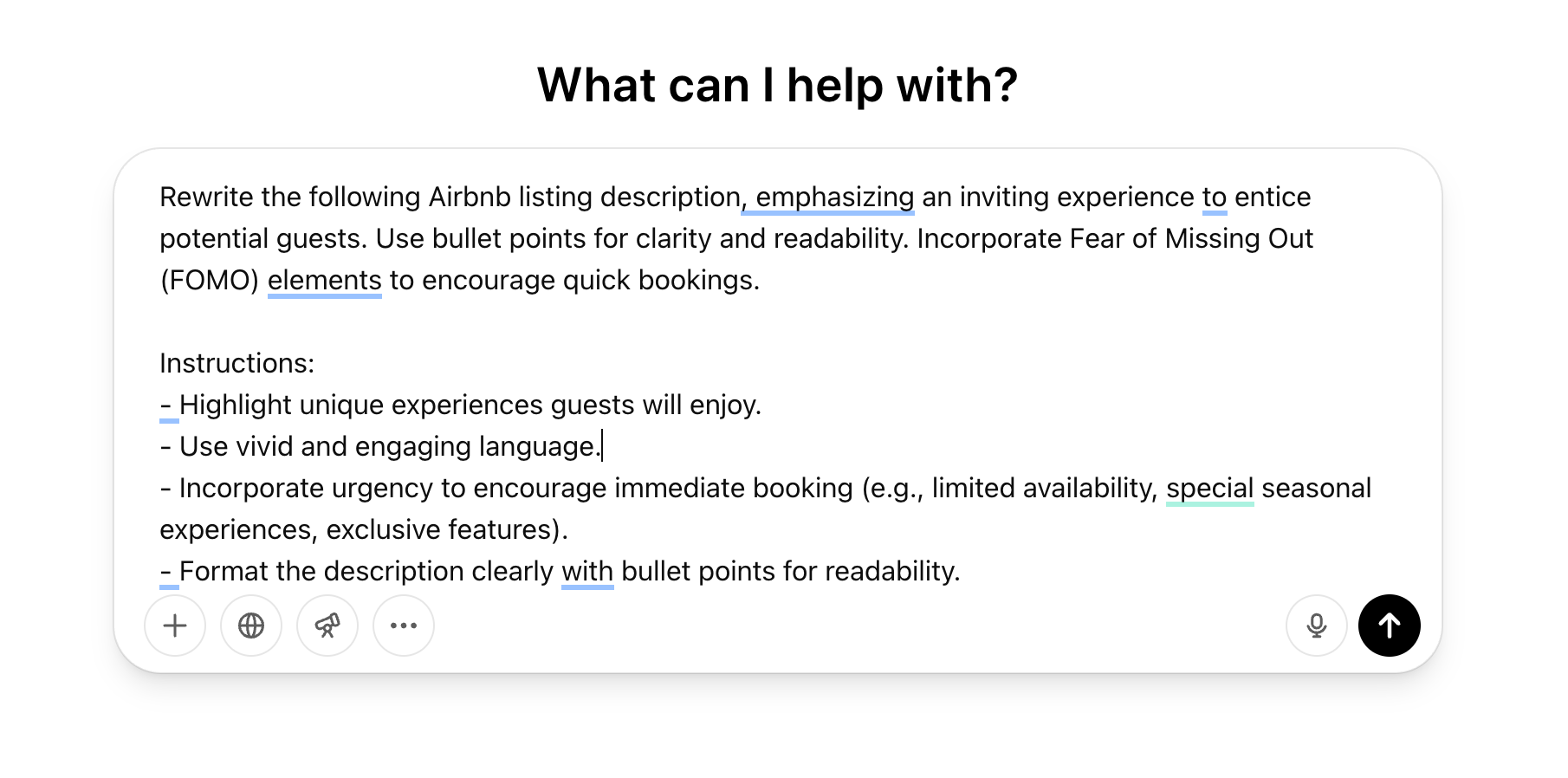
Use ChatGPT to improve your current Airbnb listing
Your Airbnb listing is like a digital storefront. It’s what guests see first, so you have seconds to make a great impression. A great listing does more than get clicks. It also leads to higher prices and more bookings. So, how do you go from overlooked to fully booked? It all comes down to smart listing optimization.
- Photos That Pop: First impressions matter, and in the Airbnb game, photos do the heavy lifting. Ditch the dim lighting and phone snapshots—invest in professional photography. Highlight clean spaces, cozy corners, and the features that make your place unique. Bright, crisp images can increase clicks and bookings by up to 20%, which helps unlock untapped revenue potential.
- Write with Passion: Don’t just share facts. Sell the experience! A “sun-drenched balcony perfect for morning coffee” paints a vivid scene. It feels warm and inviting, unlike the simple “balcony with a table.” The first phrase sparks joy and comfort, making you picture a cozy spot to relax. Remember to add local charm by noting nearby attractions or fun neighborhood spots.
- Calendar = Alive and Active: An updated calendar shows Airbnb you’re an active host. This can help your listing rank higher in search results. Also, it lowers your chances of double bookings or cancellations. Both can damage your metrics and reputation.
- Be a Response Rockstar: Airbnb rewards fast, responsive hosts. Set up notifications or use the app to respond quickly to messages and booking requests. This boosts your search ranking and builds trust with guests before they arrive.
- Stack the Stars with Reviews: A glowing review is Airbnb gold. Deliver an exceptional experience, and don’t be shy—ask happy guests to leave a review. The more five-star reviews you rack up, the more credibility (and bookings) you gain.
- Amenities That Sell: Guests seek more than just a place to stay. They want convenience, comfort, and a touch of wow. Good Wi-Fi, premium coffee maker, and comfy beds help boost prices and reviews. Extras like smart locks, Netflix TVs, or on-call professional cleaners add even more value.
Listing Optimization Impact
An optimized Airbnb listing does more than look good—it performs. Hosts with great visuals, strong copy, and upgrades for guests often see a boost in bookings and Airbnb earnings. This allows them to charge premium prices with confidence. Why? Because your listing isn’t just competing—it’s convincing. Every polished detail shows value, builds trust, and makes your experience worth booking.
5. Leverage Smart Tech to Level Up Your Airbnb Revenue Game
Let’s be real—managing an Airbnb without the right tech is like trying to DJ a party with a flip phone. The short-term rental market changes at a rapid pace. To boost your income and stay sane, you need to use powerful tools. Think automation, analytics, and other solutions that handle the hard work for you.
- Property Management Software (PMS) with Channel Management: Managing your listings across Airbnb, Vrbo, and Booking.com? Tools like Hostaway and Hospitable bring everything into one unified dashboard. These platforms handle both channel manager tasks—syncing calendars, pricing, and availability across platforms—and property management—automating guest messaging, coordinating cleanings, tracking reviews, and more. The result? No more double bookings, pricing confusion, or spreadsheet overload. Just streamlined operations and more time to grow your business.
- Dynamic Pricing Tools: Want pricing that’s not just smart, but genius? Tools like PriceLabs, Beyond, and Wheelhouse analyze demand trends. They also consider local events, lead time, and booking windows. They then suggest the best nightly rate. The result? You can see a revenue boost by just letting the algorithm do its thing—a major win for smart revenue management.
- Analytics Platforms: Ever wish you had Airbnb’s market playbook? Tools like AirDNA and Airbtics get you close. They provide clear insights into market demand. They show how competitors perform, occupancy trends, and average daily rates. Translation: an edge every successful Airbnb revenue manager needs.
- Automate Most Tasks: Set up guest messages, check-in instructions, and review reminders. No need to type them each time. Use automated messaging systems to keep communication sharp and timely. It’s the secret to high response rates and happy guests without living in your inbox.
Technology Advantage
Using Airbnb’s third-party tech tools is more than convenient. It boosts your efficiency, accuracy, and profit. This can happen with the right mix of automation, pricing, booking management, and analytics tools. The best part? They can also cut down on hours of manual work each week.
6. Turn Longer Stays into Bigger Paydays

Remote work is here to stay. Provide your Airbnb guests with a professional workspace setup
Short bookings might keep you busy, but longer stays? That’s where the real money—and sanity—is. Encouraging guests to stay longer helps you earn a steady income. It also cuts cleaning costs and reduces frequent turnover. In short: less work, more revenue.
- Offer Discounts That Make Guests Think Twice (in a Good Way): A 10-30% discount on weekly or monthly stays might look like a loss. But it often increases occupancy, as it’s good for attracting guests who are more serious travelers. Digital nomads, remote workers, and snowbirds enjoy great deals. You also appreciate a calendar that fills itself.
- Boost Peak Pricing with Longer Stay Rules: During peak times, raise your minimum stay. This helps avoid gaps and boosts your earnings. Why rent to three different guests for three nights? One group could book the whole week!
- Fill Gaps Like a Pro with Smart Pricing: Do you have a 2-day window between bookings? Don’t let it go to waste. Use dynamic pricing tools to lower rates just enough to attract short-stay travelers. This way, you can also keep your revenue optimized.
- Focus on the Long-Stay Tribe: Business travelers, interns, travel nurses, and remote workers want cozy places for longer visits. Add words like “remote work-ready” or “monthly rental available” to your listing.
- Show Long-Stay Comforts: Share what makes your space great for longer visits. This includes a full kitchen, a washer and dryer, and fast Wi-Fi. There’s also a dedicated workspace and blackout curtains for better sleep. The more livable it looks, the longer they’ll stay.
Length of Stay Impact
Here’s the kicker: longer stays don’t just pad your revenue—they compound it. You’ll pay less for cleaning fees. You’ll save time on turnovers. Plus, you’ll have steadier cash flow. Hosts who use smart length-of-stay strategies achieve a significant boost in their monthly income. They also enjoy better occupancy and less wear and tear from frequent guest turnover. Long stays mean less stress and higher returns.
7. Make Peak Seasons Your Profit Seasons
When demand skyrockets, so should your earnings. Just know how to take advantage of it.
- Spot the Gold Rush Early: Find your local high-demand times. Look for summer holidays, big sports events, conferences, or seasonal attractions. Tools like PriceLabs help you spot demand surges ahead of time. This way, you won’t catch yourself off guard when prices rise.
- Price Like a Pro (and Do It Early): Set your peak pricing well ahead of time. Many guests plan ahead for big events and seasonal trips. So, don’t undersell your listing just because you waited too long to make changes. Lock in premium rates early and secure top-dollar bookings before the latecomers arrive.
- Set Smarter Minimum Stays: Two-night bookings during high-demand weekends? That’s rookie-level stuff. Set a minimum of 3 to 5 nights during busy times. This helps reduce gaps, cut turnover, and raise revenue for each reservation.
- Create Irresistible Event Packages: Going beyond just a place to sleep? That’s a huge win. Offer themed packages, such as wine-tasting tours in the harvest season. Also, provide VIP shuttle service to the local music festival. These extras let you charge premium rates and create memorable guest experiences.
- Team up with Local Legends: Join forces with local cafés, yoga studios, or event planners. Offer special perks just for them. Not only does this sweeten the deal for guests—it also boosts your listing’s appeal in a crowded market. Think: “Stay here and get exclusive access to expert surfing lessons.”
Peak Season Revenue Boost
Nail your strategy during peak times. You’re not just earning more; you’re multiplying your potential. Well-optimized listings can command 2–3x higher nightly rates during high-demand periods. Happy guests, lower turnover, and higher booking values can boost your annual revenue. In short, don’t just survive the busy season—dominate it.
8. Turn Happy Guests into Higher Profits
Let’s be honest—great hospitality sells. When guests feel cared for, they don’t just leave five-star reviews. They also return, tell their friends, and spend more next time. In the world of Airbnb, a standout guest experience is your secret weapon for revenue growth.
- Master the Art of Communication: Make guests feel like VIPs from the moment they book. Send friendly pre-arrival messages. Include check-in instructions, Wi-Fi details, parking tips, and local recommendations. Clear, proactive communication reduces anxiety and bad reviews.
- Add Thoughtful Touches That Wow: It’s the little things that make a big impact. A handwritten welcome note, a bottle of wine, or snacks tailored to the guests’ preferences go a long way. These moments don’t cost much but leave lasting impressions that lead to rave reviews.
- Cleanliness is Queen (and King): No amount of charm can save you from a dusty countertop. Guests expect hotel-level hygiene—especially post-pandemic. Hire a top cleaning team. Make detailed checklists to keep five-star standards every time.
- Be a Hospitality Ninja: When problems come up—like a broken lamp, a late-night lockout, or Wi-Fi issues—act fast and solve them. Your quick thinking and calmness can change a complaint into a great review.
- Go Beyond the Basics: Surprise your guests! Offer amenities they didn’t expect. Include a Nespresso machine, luxury toiletries, board games, or a Spotify-connected smart speaker. Adding surprise extras brings joy and helps your property shine.
Guest Experience Revenue Impact
Here’s the deal: exceptional experiences equal exceptional income. Listings with great reviews rank higher. They also convert faster, as 95% of modern consumers read reviews before making a purchase. Even better? Happy guests become loyal guests, returning for repeat stays and telling their networks. When your reputation precedes you, in the best way, your revenue follows.
9. Master the Off-Season Like a Revenue Pro
Every Airbnb host loves peak season—bookings pour in, rates soar, and life is good. But what separates a great host from a revenue rockstar is how you handle the slow months. Off-peak periods don’t have to be a revenue drought. Use smart strategies to turn quiet seasons into steady income.
- Price Smart, Not Desperate: Lower demand can lead to lower prices. But don’t cut prices without thinking. Use dynamic pricing tools to find the sweet spot where value meets profitability. Attract savvy travelers without devaluing your brand.
- Shift Your Audience: Peak season is for vacationers, but off-peak? That’s when digital nomads, business travelers, and remote workers shine. Tailor your listing (and marketing!) to appeal to longer stays and weekday bookings.
- Create Irresistible Packages: Think: “Winter Escape Deal” or “Work-from-Anywhere Week.” Bundle discounted stays with perks like early check-in, late check-out, or local experiences. Packages add value while providing a nuanced justification for your rates.
- Sell the Quiet Charm: Off-season isn’t boring—it’s peaceful. Highlight fewer crowds, cozy cafés, seasonal events, and foliage hikes. Tell a story in your listing description. Create a vision of a perfect, quiet getaway.
- Monetize Differently: Still have gaps in your calendar? Pivot. Explore monthly rentals, corporate housing, or even positioning your property as an airport lodge. If you’re near a major hub, travelers will be looking for convenience and comfort before or after flights—your place could be their go-to landing spot.
Off-Peak Revenue Strategies That Work
Mastering seasonality helps you thrive, not just survive, during slow times. Change your strategy, target new audiences, and showcase off-season appeal. This way, you can increase occupancy and maintain cash flow all year. The result? A healthier bottom line and far fewer revenue rollercoasters.
10. Improve and Adapt Your Strategies
If Airbnb hosting were a video game, top earners wouldn’t just play. They would keep leveling up. In the fast-changing world of short-term rentals, successful hosts stay on their toes. Continuous improvement isn’t a choice—it’s your secret weapon. It drives steady revenue growth and helps you dominate in the long run.
- Conduct an Expert Performance Audit: Avoid proceeding without clear guidance. Dive into your metrics monthly. Analyze booking patterns, revenue per night, occupancy rates, and guest feedback. Is your cleaning fee scaring people off? Is your average nightly rate lagging behind similar listings? Use the data to tweak and tighten your game.
- Stay Ahead of Market Shifts: The short-term rental landscape experiences ongoing changes. Keep an eye on local real estate trends. Also, watch for new regulations, like zoning laws. Lastly, note any changes in traveler behavior. Staying informed helps you pivot quickly before changes impact your bottom line.
- Test, Tweak, Repeat: Think of your Airbnb as a mini startup. Try new pricing strategies, add different amenities, or change listing photos and descriptions. Track the results. Small changes can make a big difference. For example, adding blackout curtains or using dynamic pricing can boost revenue.
- Invest in What Pays You Back: Regular property updates are not just for looks—they’re smart moves. Upgrading your mattress or adding a hot tub can boost your rates. These improvements can also enhance your guest experience. Happy guests = great reviews = more bookings = more income.
- Learn from Your Tribe: You’re not alone. Join local host groups, Airbnb forums, or STR communities on Reddit or Facebook. Swap stories, share what’s working, and learn from others’ missteps (so you don’t make them yourself). A rising tide lifts all hosts.
Adaptation for Revenue Growth
Revenue growth isn’t a one-time trick—it’s a skill that sharpens over time. Hosts who review and improve their strategy on a regular basis see gains each year. Stay flexible, curious, and open to change. This way, you can make your short-term rental a long-term income machine. Remember: in this game, the only constant is improvement.
11. Schedule Time to Optimize Your Revenue Strategy Weekly
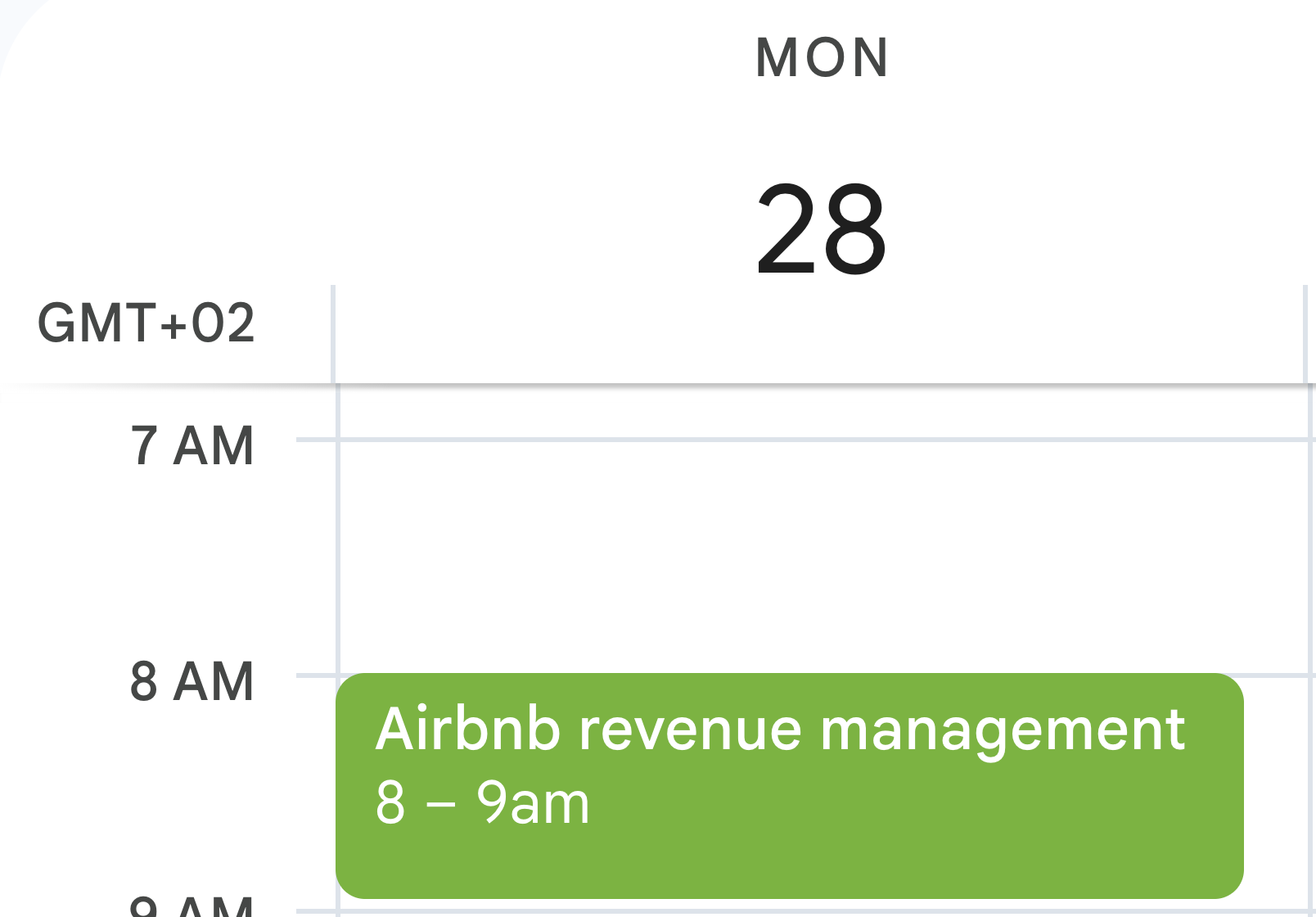
Schedule time for your Airbnb revenue management weekly or bi-weekly
Let’s be honest—Airbnb hosting isn’t “set it and forget it.” If you want to keep your calendar full and your profits climbing, you need to treat your listing like a business. That means checking in regularly—not just when bookings slow down. A weekly revenue review is your secret weapon. Think of it as your financial fitness check. Just like exercise keeps you fit, regular pricing and performance updates keep your listing sharp and popular.
- Block Time on Your Calendar: Start by carving out 30–60 minutes each week. Label it something that gets your attention: “Revenue Power Hour” or “Profit Check-In.” Log in to Airbnb or your property management software during that time. Examine your listing(s) and analyze their performance in detail. Are your prices aligned with current demand? Are there new events or holidays you should account for?
- Run a Weekly Pricing Review: Check how your rates compare to competitors in your area. Did your neighbor just drop their prices? Are others charging more for upcoming weekends? Adjust your rates based on careful analysis, not feelings. When using dynamic pricing tools like PriceLabs or Beyond, check the suggested changes. Adjust them if necessary. Add a pricing floor to avoid underselling during slow periods.
- Look for Booking Gaps & Opportunities: Did a guest cancel for next week? Are there holes in your calendar mid-week? Use this time to fill them with creativity. Adjust your rate downwards for slow days, or apply a last-minute discount. If there’s a festival or conference coming up, raise prices early while demand is still climbing.
- Track Key Metrics Weekly: Jot down your average nightly rate, occupancy, and revenue. Compare it to last week, last month, or last year. Over time, this data helps you spot trends and take action before your competitors do. A spreadsheet or simple dashboard will do the trick. The better you track, the more confident you will feel about pricing decisions.
Make It a Habit, Reap the Rewards
Weekly pricing check-ins may not sound exciting, but they’re a serious moneymaker. Consistent effort leads to smarter pricing, higher occupancy, and more revenue. And unlike big upgrades or renovations, this only costs you a bit of time. So grab a coffee, open your dashboard, and get into the habit. Future you—and your bank account—will thank you.
12. Supercharge Your Earnings with a Specialized Airbnb Marketing Agency

Contact us today
Struggling to find time to improve your revenue strategy? Or do you feel like your tactics aren’t working? To boost your revenue, think about hiring an Airbnb marketing agency. These aren’t just glorified marketers—they’re your backstage revenue rock stars.
- Targeted Marketing Wizardry: These agencies live and breathe Airbnb. They understand the platform’s search quirks. They know how guests browse. They can create listings that grab attention. They create marketing strategies just for you. This includes dynamic pricing and custom descriptions. They focus on your unique space and ideal guest.
- Deep-Dive Data & Analytics: Forget gut instinct. Top agencies use advanced tools and data systems. These compete with Airbnb’s dashboards. You’ll receive performance breakdowns, market trend analyses, and competitive benchmarks. These tools help you make data-driven decisions to boost your ROI.
- Multi-Channel Visibility: Why settle for just Airbnb? These experts can boost your listing on Vrbo, Booking.com, and Google Vacation Rentals. They can also manage ads and email campaigns. The result? More eyes on your property and more bookings on your calendar.
- Your Property, Branded: Great listings are memorable. Agencies create a strong brand for your property. This means clear messaging, a great visual style, and logo design. It’s how you go from “just another listing” to “that must-book spot in town.”
Partnering with Experts = More Revenue, Less Stress
A specialized Airbnb marketing agency can simplify property management and provide added benefits. You’ll enjoy expert marketing, better exposure, and stronger performance analytics. You’ll have time to focus on what you enjoy most. Whether it’s greeting guests or growing your short-term rental empire, you can dive in!
👉 Ready to elevate your hosting game?
Our Airbnb marketing agency helps you earn more. We help you book your property and create a space that guests love.
Let’s turn your listing into a top performer—starting today.
Airbnb Revenue Management Strategies Recap: Your 12-Step Playbook to Higher Profits
Ready to take your Airbnb profits to the next level? Here’s a quick rundown of the 12 expert strategies we covered—each one designed to help you earn more, book smarter, and manage revenue like a pro.
- Master the Fundamentals of Airbnb Revenue Management: Build a strong foundation by understanding the key principles that drive higher profits: dynamic pricing, market analysis, occupancy optimization, length of stay, and seasonal adjustments.
- Implement Dynamic Pricing Like a Pro: Use real-time data to adjust nightly rates and capture the highest possible revenue.
- Analyze the Market Trends and Competition: Stay ahead of the game by monitoring local trends and pricing smarter than your competitors.
- Optimize Your Airbnb Listing for Maximum Visibility: Turn browsers into bookers with a polished, engaging, and high-converting listing.
- Leverage Smart Tech to Level Up Your Airbnb Revenue Game: Automate the heavy lifting with tools that optimize pricing, guest messaging, and performance tracking.
- Turn Longer Stays into Bigger Paydays: Encourage weekly and monthly bookings to reduce turnover and earn more with less hassle.
- Make Peak Seasons Your Profit Seasons: Capitalize on high-demand periods by raising rates and maximizing occupancy with confidence.
- Turn Happy Guests into Higher Profits: Deliver top-tier hospitality that fuels repeat stays, referrals, and glowing reviews.
- Master the Off-Season Like a Revenue Pro: Keep income flowing year-round with smart pricing, niche targeting, and special offers.
- Improve and Adapt Your Strategies: Stay flexible and growth-minded by regularly testing, learning, and fine-tuning your approach.
- Schedule Time to Optimize Your Revenue Strategy Weekly: Block time each week to review pricing, track performance, and adjust based on demand shifts.
- Supercharge Your Earnings with a Specialized Airbnb Marketing Agency: Partner with pros who know how to drive bookings, boost visibility, and unlock your listing’s full earning potential.
The Bottom Line
Mastering Airbnb revenue management isn’t just a checklist. It’s an ongoing process. Fine-tune your playlist for guests. Adjust based on vibes like market trends, guest feedback, and booking data. The more you tweak, the better their experience—and the bigger your payoff.
Using the strategies in this guide helps you increase your income. You’re also making your Airbnb business smarter and stronger. Dynamic pricing, competitor analysis, and amazing guest experiences lead to better rankings. They also create glowing reviews and more repeat bookings.
So don’t just manage—optimize, elevate, and evolve. In the world of short-term rentals, those who adapt not only survive—they thrive.
Frequently Asked Questions
Q: What strategies can I use to optimize my Airbnb revenue?
A: Revenue optimization is like a recipe for success. You need the right ingredients and good timing. Start with dynamic pricing to ride the waves of demand like a pro pricing surfer. Add a dash of market analysis to stay ahead of your competition. Occupancy optimization keeps your calendar full without dropping your rates too low. Want fewer turnovers? Offer length-of-stay discounts to entice longer bookings. Keep in mind the secret sauce: seasonal adjustments help your pricing shine during ski season and summer break.
Q: How does dynamic pricing with PriceLabs actually help?
A: Imagine having a super-smart pricing assistant who watches the market 24/7. That’s PriceLabs. It automatically adjusts your rates based on real-time demand, competition, and local trends. PriceLabs helps you earn more during busy music festival weekends. It also keeps you competitive during slow midweek times.
Q: What are the biggest profitability drivers in Airbnb hosting?
A: Profitability isn’t just about charging more—it’s about strategic finesse. Your pricing strategy sets the tone (hello, dynamic pricing). Occupancy rates determine how often you’re getting paid. Market trends show when to change direction. A great guest experience brings more 5-star reviews. It also leads to repeat bookings and the chance to raise prices. Think of it like a flywheel: a strong strategy leads to more bookings. More bookings lead to more reviews. Then, more reviews help you raise your prices. Boom—profit.
Q: How can I use market data to boost my Airbnb income?
A: Data is your Airbnb cheat code. First, check what competitors charge and their occupancy rates. Look at similar listings to see their prices and booking levels. Track local events like marathons, conventions, or graduations. This helps you time your rate spikes. Furthermore, you can also use data to determine which property upgrades will bring higher revenue. Use platforms like AirDNA. You can use it to explore booking behaviors and property upgrades. The result? A listing that operates with high efficiency, maximizing results while minimizing effort.




